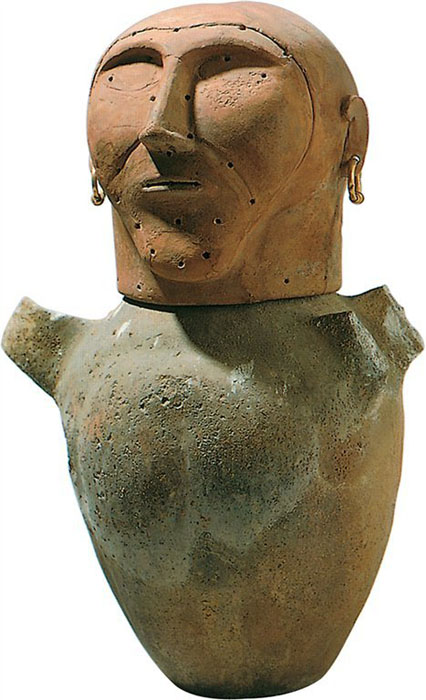Human-headed cinerary urn, 675-650 BCE.
Etruscan. Terracotta, height: 64.8 cm.
Museo Etrusco, Chiusi.
Etruscan Doctrine of Death and the Afterlife
It must be supposed that the Etruscan conceived of a judgment after death in the form of a system of rewards and punishments. However the Etruscan representations in the tombs give no clear evidence of any judicial process, containing nothing analogous to the Osiris trial, the weighing of the soul, the sentence, and the award accordingly, which are so prevalent on the monuments of Egypt. An important element in the religion of Etruria was the doctrine of Genii, a system of household deities or guardian spirits who watched over the fortunes of individuals and families, and who are continually shown on the engravings in the sepulchres as guiding, or actively interested in, all the incidents that happen to those under their care. It was supposed that every person had two genii allotted to him, one inciting him to good deeds, the other to bad, and both accompanying him after death to help determine the fate of the deceased. Good and evil spirits compete for the possession of souls in the underworld; the bad genii pursue some, and threaten them or torment them; good genii protect others and save them from the dark demons who attempt to drag them to the place of punishment. The genii or spirits often had distinctive identities and were depicted in Etruscan tombs. One of the most clearly marked of these is Vanth, or Death, who appears in several of the sepulchral scenes, either standing by the door of an open tomb, or prompting the slaughter of a prisoner, or otherwise encouraging carnage and destruction. Another is Kulmu, “god of the tomb,” who bears the fatal shears in one hand and a funeral torch in the other, and opens the door of the sepulchre in order receive into it a fresh inmate. A third being of the same class is Nathuns, a sort of male fury, represented with tusk-like fangs and hair standing on end, while in either hand he grasps a serpent by the middle, which he shakes over avengers, in order to excite them to the highest pitch of frenzy. This belief, sincerely held, would obviously exert a powerful influence over their feelings in the conduct of life.
